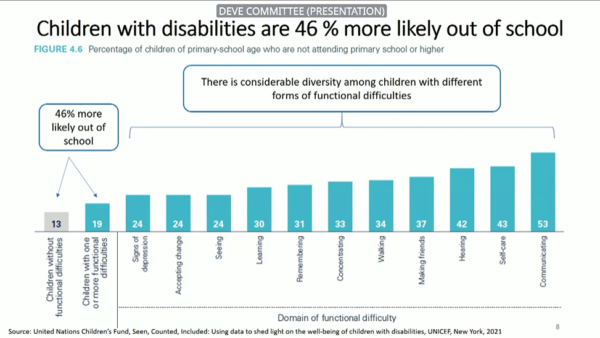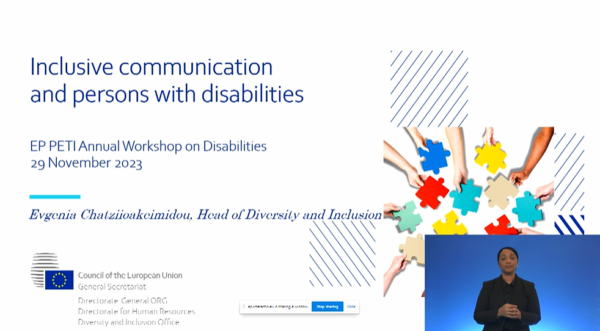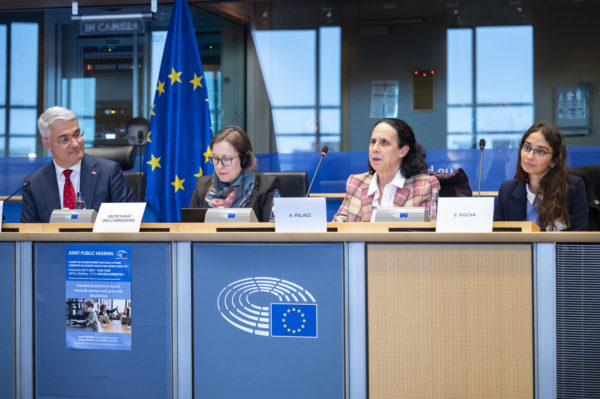The European Parliament organised its first “Disability Rights Week” to mark the International Day of Persons with Disabilities. It took place from 27 November to 4 December.
Below, you can read a summary of the relevant events:
Development Committee: Access to education and training for persons with disabilities in developing countries
This debate took place on 28 November and focused on the challenges children with disabilities face in accessing education in the Global South, along with the suitable solutions to address these challenges.
It consisted of presentations from Suguru Mizunoya, Technical Cooperation Team Lead of UNESCO-IIEP; Fatma Wangare Haji, Regional Coordinator of Inclusion Africa and Estefanía Mirpuri, Director General of the ONCE Foundation for Latin America, followed by a debate.
Mr Mizunoya delved into the broader spectrum of challenges encountered by children with disabilities, providing key statistics related to the enrolment of students with disabilities. Ms Wangare Haji shed light on the stigma and discrimination experienced by children with intellectual disabilities in Kenya, and Ms Mirpuri addressed the unique challenges faced by students with vision impairments in Latin America.
MEPs Mercedes Bresso (Italy), Silvana González (Spain), Juknevičienė (Lithuania) and Hölvényi (Hungary) participated in the debate, among others.
The debate highlighted that:
- 33 million children with disabilities worldwide are out of school.
- The main challenges faced by children with disabilities are accessing education including identifying students with disabilities due to social prejudices and stigma: the denial of admission to school due to disability, lack of trained teachers, lack of appropriate resources that support students with disabilities, poorly adapted school facilities and learning materials.
- Economic challenges, especially insufficient financial support from governments and schools for providing assistive technology or accessible resources
The key recommendations highlighted by the speakers to address these challenges included:
- Building a more inclusive data collection system.
- Enhancing capacity in the inclusive education sector.
- Supporting teachers to master inclusive pedagogy, ensuring targeted financing for children with disabilities.
- Fostering cross-sectoral collaboration and partnerships (including with organisations of persons with disabilities);
During the debate, MEP Silvana González (S&D Group) emphasised the importance of integrating the disability agenda across all policy domains. She stressed the need for external action policies to incorporate a disability aspect:
MEPs advocate for a comprehensive strategy for persons with disabilities in humanitarian and development aspects.
MEP Hölvényi (EPP Group) highlighted the lack of funding, including EU funding, targeting inclusive education.

Petitions Committee: Annual workshop on the rights of persons with disabilities
This debate took place on 29 November and focused on two topics: the cost-of-living crisis and inclusive communication.
It consisted of a presentation from Magdi Birtha, Research team leader on Social Protection and Inclusion at the European Centre for Social Welfare Policy and Research, of the study “Targeted measures for persons with disabilities to cope with the cost of living crisis” and a debate. Members of the European Parliament (MEPs) Estaràs-Ferragut (Spain), Marc Angel (Luxembourg), and Maestre Martín De Almagro (Spain) participated in the debate, among others.
The debate highlighted:
- In 2021, persons with disabilities faced a higher risk of poverty and social exclusion compared to persons without disabilities (29.7% versus 18.8 %) despite, initiatives to support persons with disabilities during the cost-of-living crisis.
- The recent crisis have had an impact on the economic situation of persons with disabilities who already had lower incomes due to barriers to access the labour market.
- The importance of improving data collection on the situation of persons with disabilities.
Our Vice-President Pat Clarke participated in the debate on the cost-of-living and energy poverty crisis, stressing the barriers faced by persons with disabilities, additional and magnified costs in times of crisis, and the lower employment and average income of persons with disabilities. Pat stated:
Persons with disabilities face barriers that for many, limit their ability to ensure a stable and sufficient income. On top of this, the average cost of living for persons with disabilities far surpassed that of persons without a disability. Any rise in living costs is therefore magnified for persons with disabilities, and their ability to absorb these costs through increased income is often limited.
MEP Marc Angel (Luxembourg) particularly highlighted the issue of better integration of persons with disabilities in the labour market:
Talking about labour, I am happy that the European Disability Forum reminds us of something that is unacceptable, that still in some Members States the disability allowances are retained when persons with disabilities access the labour market. We know that the living costs are higher if you have a disability, and you need technical appliances and assistance. This is really unacceptable.
The workshop was followed by a debate on Petitions for discussion in Committee.

Employment and Women’s Rights Committees: Harmful practices in the EU towards women and girls with disabilities
This debate took place focused on eliminating practices that affect women and girls with disabilities, including forced sterilisation, forced contraception, and the lack of accommodations and recognition for women with disabilities who experience gender-based and domestic violence.
It consisted of a presentation from our Secretary-General Ana Peláez Nárvaez and the Vice-chair of the EDF Women’s Committee, Sara Rocha, followed by a debate. Members of Parliament Katrin Langenseipen (Germany), Abir Al-Sahlani (Sweden), Alicia Homs Ginel (Spain), and Rosa Estaràs Ferragut (Spain) participated in the debate.
The debate highlighted:
- The widespread human rights violations faced by women with disabilities, including violence, forced sterilisation, discrimination in employment, and the increased vulnerability of women living in institutions.
- The need to collect data and fund research about these issues.
- The lack of education for and about issues facing women with disabilities.
Vice-chair of the EDF Women’s Committee, Sara Rocha, called the Members of Parliament to action in the fight to end forced sterilisation:
What can you do? Help us. Criminalise these practices. Regulate, deeply, institutions that are actually doing these practices. Fund us. Fund independent living. Fund community services. Fund sex education for women and girls with disabilities. Fund accessibility. Fund us.
Our Secretary-General Ana Peláez Nárvaez highlighted the lack of actions by the European Union to protect the rights of women and girls with disabilities and the purposeful omission of their rights when ratifying the Istanbul Convention.
A recording of the debate on “Harmful practices in the EU towards women and girls with disabilities” is available.
